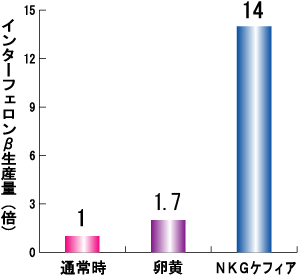Study Overview
A collaborative study conducted between Kyushu University and Nihon Kefia Co., Ltd. explored the immunomodulatory effects of kefir, specifically focusing on sphingolipids a unique class of lipids naturally present in NKG kefir.
Key Finding
The study revealed that sphingolipids in NKG kefir increased the production of interferon-beta (IFN-β) by 14 times compared to baseline levels.
Why It Matters
Interferon-beta is a type I interferon that plays a critical role in the innate immune response, especially in antiviral defense, immune regulation, and inflammation control. It acts as a signaling molecule that alerts nearby cells to the presence of pathogens, helping to mount a coordinated immune response.
Mechanism (Proposed)
While the exact mechanism is complex, sphingolipids are known to interact with membrane receptors and intracellular signaling pathways that regulate cytokine production. In this study, the sphingolipids in NKG kefir appeared to stimulate dendritic cells and/or epithelial immune responses, leading to enhanced interferon-beta synthesis.
Potential Implications
-Functional Food Value: This highlights kefir not just as a probiotic food, but as a functional food with specific immunological benefits.
Reputation and Science
The involvement of Kyushu University, one of Japan’s top research institutions, lends scientific credibility to the findings. While this study was conducted several years ago, the data continues to support Japan Kefir’s dedication to science-based health solutions.

